Why CRM Matters to Businesses
Before we delve into the realm of Open Source CRMs, let’s first understand why CRM systems matter to businesses. A CRM system offers several benefits, including:
- Centralized Customer Data: A CRM system allows businesses to store and manage all customer-related information in a central database. This facilitates easy access to customer details, purchase history, and previous interactions.
- Improved Sales and Marketing: CRM systems enable businesses to track leads, manage sales pipelines, and automate marketing campaigns. This enhances the efficiency of sales and marketing teams, leading to increased conversions.
- Enhanced Customer Service: With a CRM system, customer support teams can promptly address queries and issues, leading to higher customer satisfaction and loyalty.
- Data-Driven Insights: CRM systems generate valuable insights through reporting and analytics, enabling businesses to make informed decisions and identify trends.
The Core Functional Features of CRM Systems
Regardless of whether it is open source or proprietary, most CRM systems share core functional features. These include:
- Sales Management: Tracking leads, opportunities, and sales pipelines.
- Marketing Automation: Automating marketing campaigns and tracking their effectiveness.
- Customer/Contact Management: Managing customer data and interactions.
- Workflow Automation: Automating repetitive tasks and processes.
- Reporting and Analytics: Generating reports and analyzing data to gain insights.
- Case Management: Handling customer support cases and ticketing systems.
The Rise of Open Source CRM Systems
Open Source CRM systems have gained significant traction due to their flexibility, cost-effectiveness, and community-driven development. Let’s explore some of the leading Open Source CRMs that rival proprietary solutions:
SuiteCRM
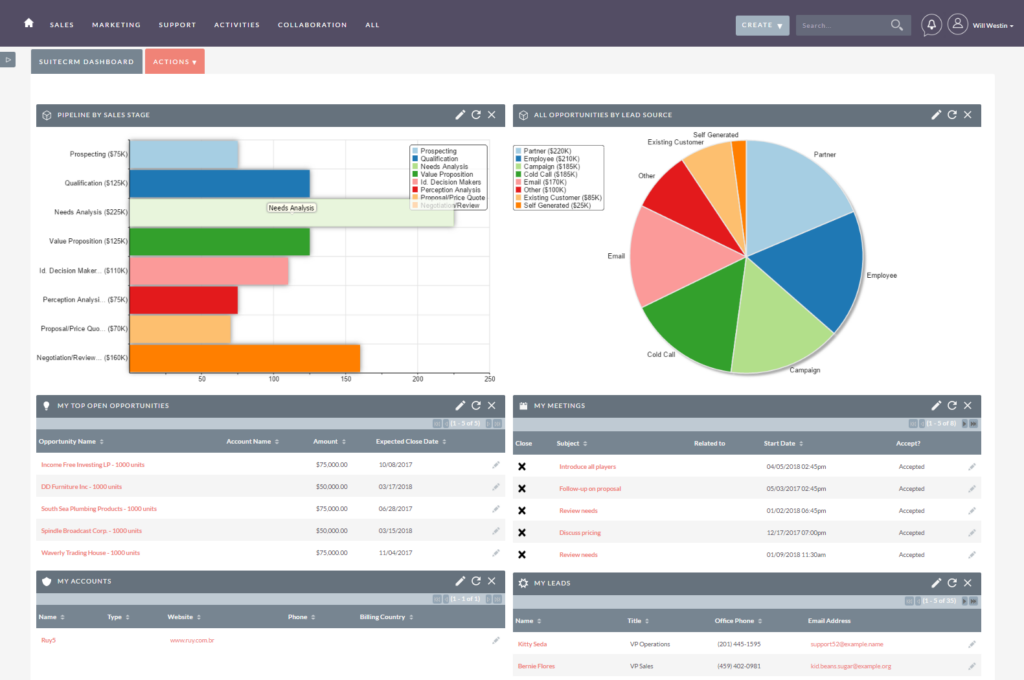
SuiteCRM, a well-established player in the Open Source CRM realm, originated as a fork of SugarCRM Community Edition. Developed on top of the LAMP stack, SuiteCRM offers extensive functional features, including sales, marketing, reporting, and customer/contact management.
One of SuiteCRM’s strengths is its customizability, achieved through the “Configuration Studio” low-code feature. Users can easily add custom fields or develop custom modules to tailor the CRM to their specific business needs. Additionally, SuiteCRM’s REST API and plugin architecture facilitate seamless integration with other systems.
CortezaCRM
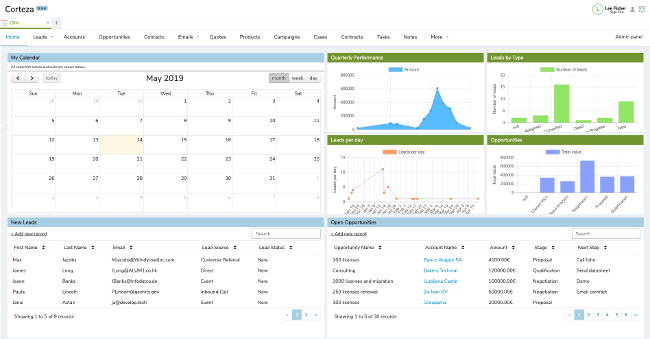
A relative newcomer, CortezaCRM is built on top of the Corteza Low Code platform written in Golang. Its functional CRM features include dashboard, contact management, reports, sales tools, tasks, and calendars.
CortezaCRM’s modern architecture, API-centric approach, and adherence to Open Standards such as OpenID Connect, OAuth2, and SCIM make it a strong contender. The platform is highly extensible and designed to integrate with other applications, making it a versatile choice for businesses seeking flexibility and integration capabilities.
EspoCRM
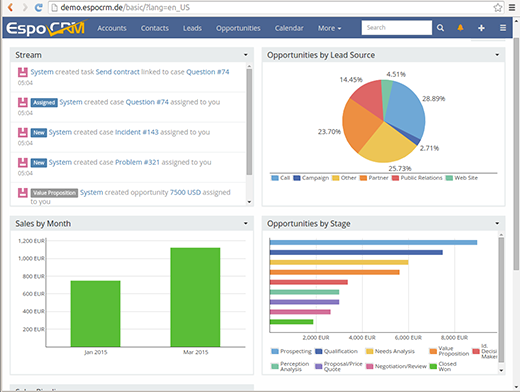
EspoCRM distinguishes itself with a Single Page Application (SPA) frontend and a REST API backend written in PHP with a MySQL database. Its functional features encompass sales automation, calendar integration, customer support, document management, inventory management, analytics, and more.
With support for 2-factor authentication and OpenID Connect, EspoCRM ensures robust security. Users can customize layouts, entities, fields, and relationships to align the CRM with their unique requirements. The platform’s extensibility via installable extensions further adds to its appeal.
Dolibarr
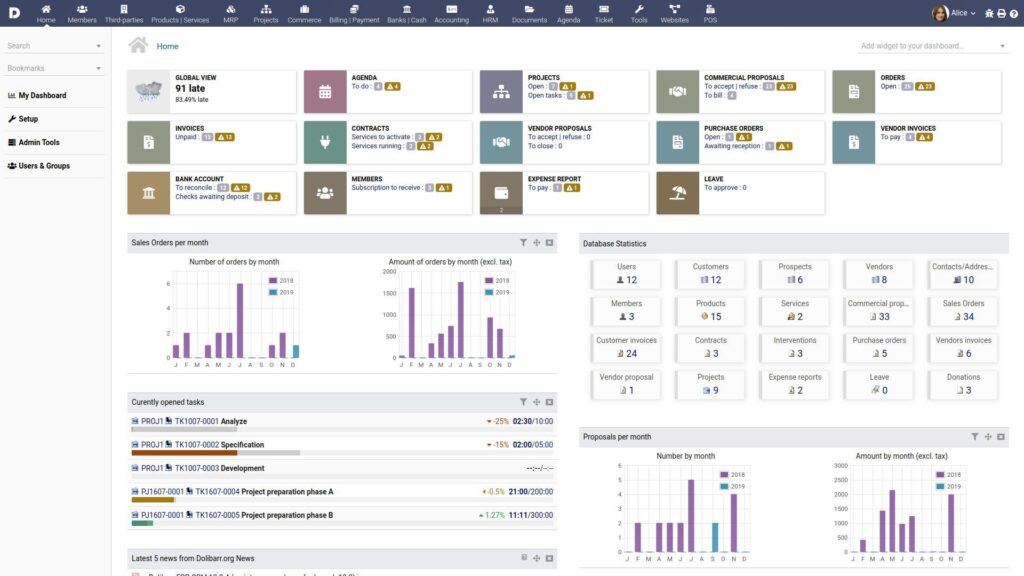
Dolibarr is not just a CRM but an all-in-one business suite that includes CRM and sales, human resource management, CMS, website and point of sale, finance and billing, marketing, and productivity features.
Dolibarr’s extensibility is driven by a module architecture, and users can rapidly develop new features using the built-in Module Builder tool. The platform’s REST API with triggers and hooks enables smooth integration with external systems, while the DoliStore marketplace offers a range of third-party add-ons.
Vtiger CRM
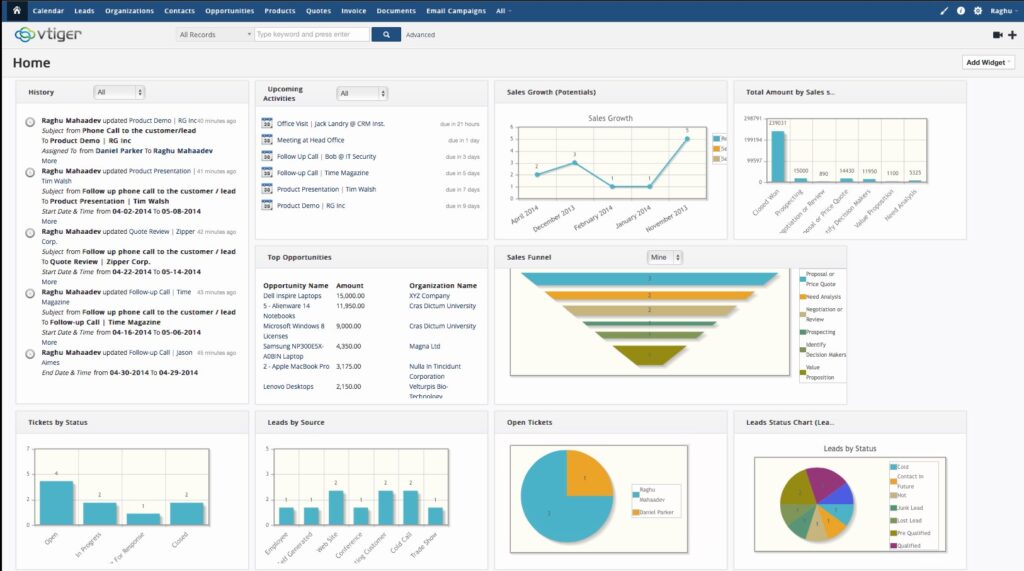
Vtiger CRM, which also originated as a SugarCRM fork, is based on the LAMP stack and offers core CRM features such as contact management, pipeline management, helpdesk, inventory management, and reporting.
The open-source version of Vtiger CRM is suitable for self-hosting, with additional paid support options available. Users can leverage Vtiger’s REST APIs for integration, and the Vtiger marketplace provides access to third-party extensions and language packs.
The Open Source Business Model for CRM Systems
The Open Source CRM landscape follows a unique business model where the software itself is available at no cost, encouraging widespread adoption. However, these projects are often monetized through various support offerings such as hosted SaaS options, support contracts, customizations, development, and integration services.
This model empowers businesses to adopt a CRM solution without incurring hefty licensing fees, ensuring accessibility and cost-effectiveness. It also fosters a vibrant community of developers and users collaborating to improve and enhance the CRM systems continuously.
The nature of CRM systems is that they are often customised extensively to meet the business processes or needs of the end user. They also frequently need to be integrated with other systems. For this reason, CRM solutions are well suited to an open source business model as the ongoing support and flexibility of the solution is of great value to the customer compared to simply purchasing the right to use the software.
Conclusion
Open Source CRM systems have emerged as formidable competitors to proprietary offerings, providing businesses with powerful tools to manage customer relationships, streamline operations, and make data-driven decisions. Regardless of your business requirements and budget, embracing an Open Source CRM is a decision that can drive growth, foster innovation, and lead to long-lasting customer success.